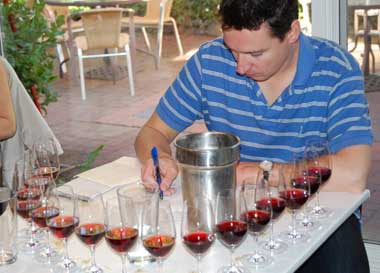What’s a good palate?
You’ve heard it many times when someone is speaking of wines – “He has a good palate,” they say. And how many of us ever ask what that means? We assumed it was something special and wondered if we’d ever get one. Or maybe we even figured we had a “palate” but weren’t sure if it was “good.” What an intimidating thought. Especially when we hear recommendations like, “the way to choose wines is to find a critic whose palate matches your own – then you can trust their recommendations.” This is how you’re supposed to avoid screwing-up and choosing the wrong wine?
 Your palate … my palate…. Does the critic’s palate match mine? I need to calibrate against critics so I can pick one that can tell me what I’ll want to drink. Hogwash.
Your palate … my palate…. Does the critic’s palate match mine? I need to calibrate against critics so I can pick one that can tell me what I’ll want to drink. Hogwash.
OK, now that I’ve gotten myself out on that limb, hand me the saw. This is going to get controversial.
Let’s start at the beginning and figure out what a “good palate” means. Then we’ll want to know if we even need one and then, if we decide we do need one, we’ll move on to figure out how to go about developing one. A logical sequence, right?
That’s a lot for one short column so we surely won’t get through it all today. At least though we’ll be able to figure out just what it means to have a good palate. We’ll just have to save the rest of the topic for another day.
So, what does a good palate mean? Walk up to someone you think knows about wines and ask them. Their knee-jerk reaction will be to tell you a good palate is about being able to taste all those flavors we use when we describe a wine. “This wine has a taste of currants with just a hint of mint and the dust of a country road under a noonday sun.” A game of, “I can taste more things in wines than you can.” He who can taste the most things in the wine must have the best palate, right? More hogwash.
Well then, maybe a good palate isn’t about how many things you can recognize but about being able to taste the same things in a given wine as the renowned critic does? The critic said there was apricot jam in there so I should be able to taste it if I have a good palate. Nope, that isn’t it either.
“OK smarty pants, then what is a good palate,” you ask?
In a nutshell, a good palate means I can tell you which wine is more acidic. I can tell you which wine is more tannic. I can tell you which wine is more aligned with its varietal character. I can understand the CHARACTER of the wine.
“Why would I want to do that,” you ask?
Because if you can’t tell an acid from a tannin or gauge the level of acids in a wine you have no hope of figuring out what foods that wine would work with and that’s a shame because wine is a drink for food. Without being able to understand the major characteristics of a wine, you’re reduced to some “do you like it” criteria. A populist crutch idea to make lazy tasters feel like they don’t need to know anything else about a wine – but we all know that we might like both bananas and steak but we know we’d rather eat baked potatoes with our steak. “Like,” even if it somehow matches up to the “right” wines, those wines the critics give high points or medals to, has nothing to do with a good palate. It can even be counterproductive and give the impression that the person must have, by some unknown but happy circumstance, developed a good palate. They quit any further progress with a false glow of achievement. Too bad.
So here are the fundamental characteristics you need to be able to recognize and rank (be able to recognize which wine has more and which wine has less) when you taste a wine. They are 1) acid, 2) tannin, 3) texture, 4) nose and 5) flavor intensity. This is something worth working towards. When you can recognize these, you’ll understand the character of the wine. You’ll have developed a good palate.
You may not always be able to identify the wine varietal (guess what, most wine professionals can’t do that blind more than about half the time) and you are unlikely to be able to identify the vintage, Chateau and vineyard the wine came from (a circus trick that has nothing to do with having a good palate). But you’ll be able to put together wines and foods without trying to memorize a book of “this goes with that” often put together by people of questionable palates anyway. You’ll be able to trust your own palate – and that’s an achievement worth some effort.
Well, as I feared at the beginning, we’ve just begun to cover the topic. We haven’t even begun to figure out how to develop that good palate – but at least now we know what it is we’re shooting for. We’ll just have to wait for another day to learn how to get there.
In the meantime, get out and taste a lot of wines. C’mon out to the Applegate and while you’re out here, I invite you to visit me at Cricket Hill – I’m always ready to talk about wines!
